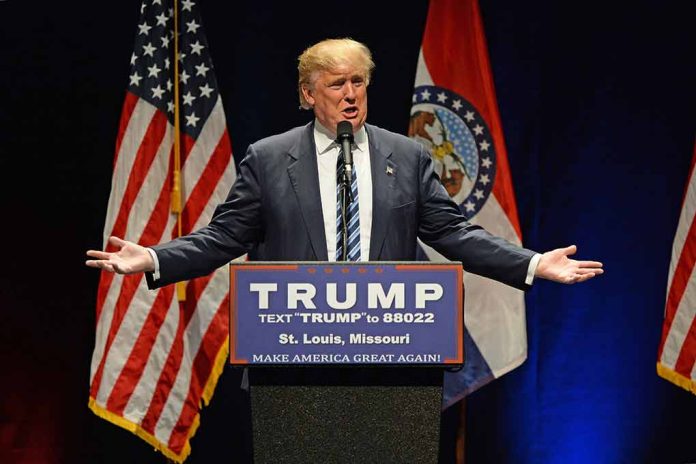
President-elect Donald Trump’s administration is gearing up to dismantle President Joe Biden’s strict fuel-efficiency regulations, potentially reshaping the future of America’s automotive industry.
At a Glance
- Trump plans to reduce fuel-efficiency requirements for new cars and light trucks.
- The move aims to reverse Biden’s policies, which Trump labels as an “EV mandate.”
- The current rules target a fleet average of about 50 miles per gallon by early 2030s.
- Automakers have invested heavily in EVs to comply with existing regulations.
- The potential policy shift mirrors Trump’s first term approach to environmental regulations.
Trump’s Plan to Overhaul Fuel Efficiency Standards
President-elect Donald Trump’s incoming administration is reportedly setting its sights on a significant rollback of fuel-efficiency requirements for new cars and light trucks. This move is part of a broader strategy to unwind Biden administration policies that Trump has criticized as an “EV mandate.” The plan involves reexamining fuel economy requirements finalized in June and targeting EPA standards on tailpipe emissions.
The current efficiency rules, established under President Joe Biden, aim for a fleet average of about 50 miles per gallon by the early 2030s. Additionally, EPA rules cap carbon dioxide emissions significantly by 2032. These policies were designed to cut greenhouse gas emissions and promote vehicle electrification, though they don’t explicitly mandate electric vehicles.
Trump's Team Plans To Roll-Back Biden's Strict Fuel, EV Regulations: Report https://t.co/ac26NAq593 pic.twitter.com/ok58y2Qdgf
— NDTV WORLD (@NDTVWORLD) November 20, 2024
Controversy Surrounding EVs and Fuel Efficiency
Critics of Biden’s regulations argue that the rules effectively require high numbers of EV sales due to their strictness. This has led to significant investments by automakers in electric vehicle technology to comply with the regulations and benefit from subsidies under the Inflation Reduction Act. However, some automakers have recently scaled back their EV plans due to reduced demand and financial losses, with some executives criticizing the policies as premature.
The move to unwind these requirements mirrors Trump’s approach during his first term, where he weakened Obama-era fuel economy plans, reducing the target to about 39 miles per gallon by 2026. This consistent stance aligns with Trump’s campaign promises and his administration’s broader environmental policy goals.
Potential Impact on Biden’s Environmental Agenda
Trump’s planned reversal of Biden’s fuel efficiency standards is just one part of a larger strategy to reshape environmental policies. The incoming administration is expected to target a wide range of Biden Administration policies on the environment, potentially through executive orders. This could include significant deregulation, reducing the EPA’s budget, increasing fossil fuel production, and potentially withdrawing from the Paris Climate Agreement once again.
The administration’s energy policies are expected to emphasize fossil fuels, deregulation, and reducing reliance on foreign energy sources. This approach could have far-reaching implications for the automotive industry, potentially altering the trajectory of electric vehicle adoption and impacting the strategies of major car manufacturers who have invested heavily in EV technology.
Broader Policy Implications
Beyond environmental regulations, the Trump administration’s plans encompass a wide range of policy areas. These include changes to healthcare, with attempts to repeal the Affordable Care Act, tax policies aimed at extending the Tax Cuts and Jobs Act and lowering corporate tax rates, and immigration plans that include mass deportations and completing the border wall. In foreign policy, the administration is expected to take strong stances on China, potentially negotiate with Russia, and revisit trade agreements like USMCA.
As the transition to a new administration unfolds, the automotive industry, environmental groups, and consumers alike will be closely watching the developments in fuel efficiency regulations. The outcome of these policy changes could significantly impact the future of transportation in America, influencing everything from vehicle design and manufacturing to consumer choices and environmental sustainability.
Sources
- Trump Plans to Roll Back Biden’s Stricter Fuel-Efficiency Standards
- Trump Team Targets Auto Mileage Rules He Blasted as ‘EV Mandate’
- Trump administration plans to roll back Biden’s stricter fuel-efficiency standards
- A Look at the Upcoming Trump Administration’s Policy Priorities














